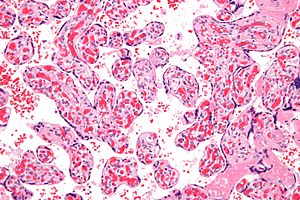Chorangiosis
Jump to navigation
Jump to search
Chorangiosis is a relatively common placental pathology.
| Chorangiosis | |
|---|---|
| Diagnosis in short | |
 Chorangiosis. H&E stain. | |
|
| |
| LM | increased blood vessels in the terminal villi, diffuse |
| LM DDx | placental villous immaturity |
| Site | placenta |
|
| |
| Associated Dx | diabetes mellitus, gestational diabetes, smoking, IUGR |
General
- Should not be confused with chorangioma.
- Relative common among babies in ICU ~5%.[1]
- Increased fetal morbidity and mortality.[2]
Associations:
Gross
- Usually not seen on gross pathology.
Microscopic
Features:
- Increased blood vessels in the terminal villi.
- Lesion not well circumscribed.
- Villi tend to be larger and have centrally placed blood vessels.[9]
Notes:
- Normal villi have up to five vascular channels.[7]
DDx:
Images
Sign out
PLACENTA, UMBILICAL CORD AND FETAL MEMBRANES, CESAERIAN SECTION: - PLACENTAL DISC WITH CHORANGIOSIS. - THREE VESSEL UMBILICAL CORD WITHIN NORMAL LIMITS. - FETAL MEMBRANES WITHIN NORMAL LIMITS. COMMENT: Chorangiosis is a nonspecific finding that may be associated with diabetes, smoking or high altitude.
PLACENTA, UMBILICAL CORD AND FETAL MEMBRANES, CESAERIAN SECTION: - PLACENTAL DISC WITH: -- CHORANGIOSIS. -- FOCAL PERIVILLOUS FIBRIN DEPOSITION. - THREE VESSEL UMBILICAL CORD WITHIN NORMAL LIMITS. - FETAL MEMBRANES WITHIN NORMAL LIMITS. COMMENT: Chorangiosis is a nonspecific finding that may be associated with diabetes, smoking or high altitude.
Chorangiosis and meconium
PLACENTA, UMBILICAL CORD AND FETAL MEMBRANES, CESAERIAN SECTION: - THREE VESSEL UMBILICAL CORD WITHIN NORMAL LIMITS. - FETAL MEMBRANES WITHIN MECONIUM STAINING OF THE AMNION, NEGATIVE FOR CHORIOAMNIONITIS. - PLACENTAL DISC WITH: -- CHORANGIOSIS. -- FOCAL PERIVILLOUS FIBRIN DEPOSITION. COMMENT: Chorangiosis is a nonspecific finding that may be associated with diabetes, smoking or high altitude.
See also
References
- ↑ URL: http://www.bhj.org/journal/2009_5102_april/download/pg251-252.pdf. Accessed on: 26 July 2011.
- ↑ Barut, A.; Barut, F.; Kandemir, NO.; Aktunc, E.; Arikan, I.; Harma, M.; Harma, MI.; Gun, BD. (2012). "Placental chorangiosis: the association with oxidative stress and angiogenesis.". Gynecol Obstet Invest 73 (2): 141-51. doi:10.1159/000332370. PMID 22222282.
- ↑ Soma, H.; Watanabe, Y.; Hata, T. (1995). "Chorangiosis and chorangioma in three cohorts of placentas from Nepal, Tibet, and Japan.". Reprod Fertil Dev 7 (6): 1533-8. PMID 8743160.
- ↑ Daskalakis, G.; Marinopoulos, S.; Krielesi, V.; Papapanagiotou, A.; Papantoniou, N.; Mesogitis, S.; Antsaklis, A. (2008). "Placental pathology in women with gestational diabetes.". Acta Obstet Gynecol Scand 87 (4): 403-7. doi:10.1080/00016340801908783. PMID 18382864.
- ↑ Evers, IM.; Nikkels, PG.; Sikkema, JM.; Visser, GH.. "Placental pathology in women with type 1 diabetes and in a control group with normal and large-for-gestational-age infants.". Placenta 24 (8-9): 819-25. PMID 13129678.
- ↑ Altshuler, G. (Jan 1984). "Chorangiosis. An important placental sign of neonatal morbidity and mortality.". Arch Pathol Lab Med 108 (1): 71-4. PMID 6546343.
- ↑ 7.0 7.1 De La Ossa, MM.; Cabello-Inchausti, B.; Robinson, MJ. (Sep 2001). "Placental chorangiosis.". Arch Pathol Lab Med 125 (9): 1258. doi:10.1043/0003-9985(2001)1251258:PC2.0.CO;2. PMID 11520290. http://www.archivesofpathology.org/doi/full/10.1043/0003-9985%282001%29125%3C1258:PC%3E2.0.CO;2.
- ↑ URL: http://path.upmc.edu/cases/case655/dx.html. Accessed on: 28 January 2012.
- ↑ E. Latta. 26 July 2011.